Story and photos by Shabna Ullah
Rice was very much in evidence at Tempe, West Coast Berbice with some farmers drying paddy in their yards or on the roadways.
Tractors or other agricultural machinery were in almost every yard while trucks could be seen transporting paddy from the backdam to the rice mills.
A farmer, Davidson, was drying seed paddy along the roadway and a relative, Garfield Nicholson who was visiting from overseas was assisting him. He would use it to replant his crop, he said.
He cultivates 35 acres and sells the paddy to Hakh Rice Mill at Golden Grove. This crop was “not too bad,” except that “the Gandhi fatigue a lot of farmers” and they incurred extra expense to spray it.
He said farmers were pleased with the service at the mill and that the owners “are the best in the country… they save a lot of farmers. If you need money to spray or make dam, they would give an advance and they give diesel when we need it.”
He just wished the paddy price was higher. Farmers were earning $3,500 per bag earlier in the crop but that figure was reduced to $3,000, compared with over $4,000 they made during the last crop.
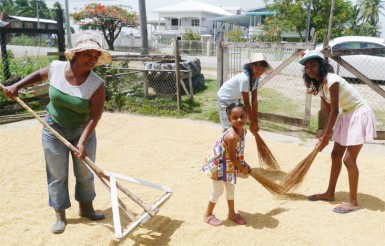
with two cousins, drying paddy in the yard
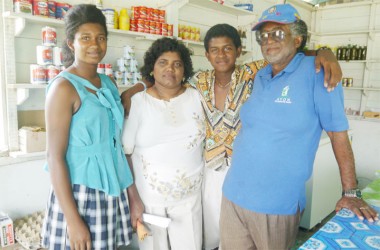
Another farmer, Motie Singh who stopped by at the same time told this newspaper, “We could a live with the $3,500 but with $3,000, that look hard for farmers to clear their expenses.” Luckily he had already sold his paddy to the mill before the price dropped.
Singh too was happy with the service at Hakh’s mill and said “if you take fertilizer from them they give you priority at the mill.”
According to him, the miller was “quite right because paddy plenty… Everybody planting; almost all the land occupied.”
He said another miller is offering $2,500 (cash) per bag and some farmers who need money urgently take the option instead of waiting to cash cheques.
Nicholson said that the “price has to be better so more persons can return home and invest in rice. They need to raise the salary too so we can come back here to live and only go overseas occasionally.”
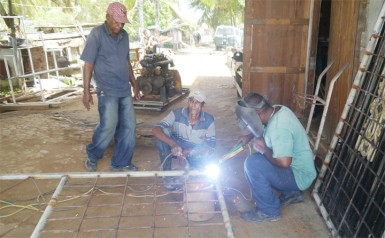
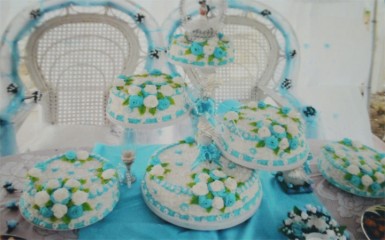
He also observed that “the rice that we eat here is substandard,” and thinks it is because “they export the best.”
During this newspaper’s visit, some Jehovah’s Witnesses were also in the area delivering their message to residents.
The village has four shops, including a convenience one operated by Fredrick Franklyn as well as two salons and a mechanic shop. While some residents engage in gold mining, others do various jobs in and out of the village.
Tempe, situated between the villages of Britannia to the west and Number 30 Village to the east, has a population of mixed ethnicities.
Easter break
The children were home for the Easter holidays and nine-year-old Elijah Todd was about to take his kite out to fly again.
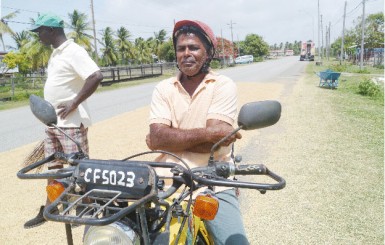
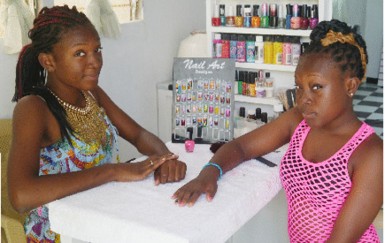
His sister, Khadijah Todd, 14, was very excited to be featured in this newspaper. She even ran over to the yard next door to inform her cousin, Lashun White, 15, about this reporter’s visit so she can “be in the papers” with her. Khadijah’s older sister operates the L & T Salon & Hair World at the bottom flat of Lashun’s house and the girls decided to pose there as they prepared to design their nails.
A third form student of the New Amsterdam Multilateral School, Khadijah planned to work on her projects and also have a fun-filled holiday. She enjoys browsing the internet and socializing on Facebook.
Lashun attends St Rose’s High in Georgetown and finds the daily travelling to be “fun but tiring at times.” She always welcomes the school vacations.
The girls had a great time picnicking at the Belladrum Beach on Easter Monday with their friends.
Across the road, the smell of curried chicken being prepared by 16-year-old Odelli Angus and her brother, Elroy Angus Jr, 15, filled the air.
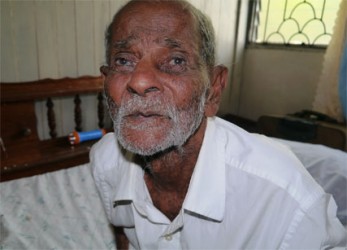
Ramlochan Bissoon
The two, both students of President’s College, were also minding the shop for their parents, Elroy Angus Sr and Haniwatie Hansraj-Angus, who were not at home.
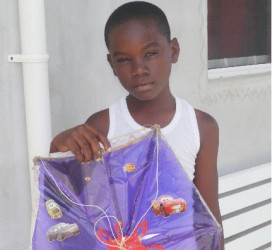
They said that whenever they are home from school they would get up early and help their parents to cook and clean. That morning Odelli had also prepared fried ochro and roti for breakfast. The siblings can cook almost anything and were also teasing each other about who could cook better. Odelli had to admit that Elroy makes better fried rice.
Pleasant and mannerly, they spoke about their activities at the boarding school and about their methods of studying. They are both talented singers and Elroy had won a singing contest at school. The siblings who are active members of school’s Bible group are also involved in sports – throwing discus, javelin and shot put.
Odelli also participates in the National Athletics/Cycling/Swimming Championships as well as playing basketball, while her brother plays table tennis and cricket.
Their parents arrived home while we were still chatting and seemed just as pleasant. Apart from operating the shop, Angus works as a sluice attendant and also plants a little kitchen garden in his yard. He too is a talented singer and was also a cricketer, football player and the “best 500 and 1,500 metre athlete at the Bush Lot Secondary School.” After school he joined the Guyana Police Force and continued to play cricket.
Haniwatie who moved from Bath Settlement is a seamstress and cake decorator. She learnt sewing from her mother and the cake decorating skills from Odelli, who had done a course. The woman now designs cakes professionally for weddings, birthdays and other occasions and also decorates bridal chairs to rent.
Angus who lived all his life in the village, said “back in those days there were only about eight to 10 houses.”
Bourne brothers
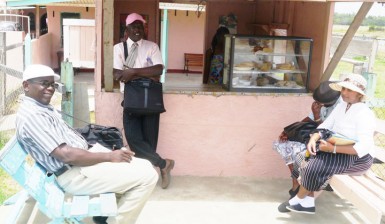
The village was bought by three Bourne brothers, one of whom was Angus’s great-grandfather, and was divided into three sections. Portions of the land were sold to other persons.
Angus’s cousin, Juliet Patram, 70, who lives across the road, said her great-grandfather, George Bourne and two his brothers worked at a balata field, bleeding balata.
Patram shares her home with a son, but two of her grandchildren were spending the Easter holidays with her. A resident of the USA for the past 12 years, she prefers to be at her own home at Tempe as she is never bored.
She recalled that in her “younger days” she worked as a seamstress and also helped her husband with his rice, watermelon and livestock farming. She still owns cattle that she keeps at the ranch at Kabawa in the Abary Creek. In another section, Temekah King was busy with household chores but took a break to speak to this newspaper briefly. She recently moved to the village from Linden and lives with her in-laws, her husband and baby.
Although Tempe is not a “spotlight village” she enjoys living there, noting that it is quite different from Linden. “The only time the village comes alive is when there is a bar-b-que and lime. It is usually very bright with lots of people coming out. When everything is finished you want to know if it’s the same village,” she said. In the end, “everybody goes back to their normal lives of being indoors.”
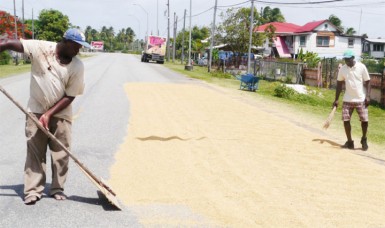
Over at Lall’s Welding Shop, his friend, Rudy was there welding a gate. Lall had gone to the backdam at the time of this newspaper’s visit. His wife, Nalini said he welds “all types of vehicles.”
Inshan Jameer, rice and cattle farmer, who lives in the same yard, plants “seed paddy to supply to farmers.”
His wife, Patricia and daughter, Tricia whom he jokingly referred to as his “workers” were helping to dry the paddy in their yard. Jameer is also a combine operator and mechanic, repairing agricultural machinery.
The oldest man in the village, 99-year-old Ramlochan Bissoon, although a bit frail, has a sharp memory. Born on September 24, 1915 at Britannia, he moved to Tempe when he was eight years old.
He boasted that he was a “first class carpenter” by profession and could have built “anything if somebody gave me the blueprint.” He also did “all kinds of work and travelled all over this country,” including to Georgetown, Mackenzie and the Berbice River.





